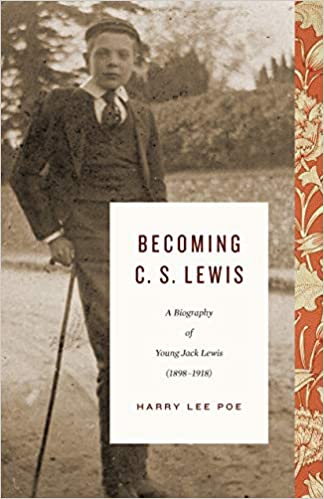A Book Review from Books At a Glance
By Andrew J. Spencer
There are many biographies of C. S. Lewis on the market. For those doing research on Lewis’ life and legacy, the volume of literature can be overwhelming, with new entries being published on a fairly regular basis. Given the sheer number of books on favorite author of many Christians and the relatively easy access provided to his personal papers, it seems impossible that a new book, published so long after Lewis’ death would contribute something new to the field of study. Harry Lee Poe has managed to do just that.
In his book, Becoming C. S. Lewis: A Biography of Young Jack Lewis (1898–1918), Poe explores the first twenty years of Lewis’ life in a depth that has not been done before. This is Poe’s third volume on C. S. Lewis. He has spent much of his academic career studying both C. S. Lewis and the other Inklings, the small literary group that included J. R. R. Tolkien, Charles Williams, and others. This book shows the marks an extended period of saturation in Lewis studies combined with helpful archival work.
The book takes nine chapters to cover approximately ten years of Lewis’ life. It begins with a chapter detailing life at the Wynyard School in England, which was run by an insane man the students called Oldie. We see from the Lewis family correspondence how awful that experience was and how it must have shaped a young man still grappling with the loss of his beloved mother. In Chapter Two, readers get a more in-depth look at a period where Lewis bounced from school to school, spending time at a short-lived school called Cherbourg, where he lost his religion and gained a love for narrative verse. This eventually led to Lewis’ time at Malvern College, which forms another dark period of his childhood as it is recorded in Surprised by Joy.
The third chapter delves into the beginning of Lewis’s long-lasting friendship with Arthur Greeves, which began in the spring of 1914. Poe argues this friendship helped Lewis from becoming hopelessly antisocial, as the bullying at Malvern College had largely turned him inward. Chapter Four surveys Lewis’ arrival at Great Bookham, where he studied under W. T. Kirkpatrick. This chapter expands on the information available in Surprised by Joy by interweaving a great deal of Lewis’ correspondence to enrich our understanding of that happy period of his life. The fifth chapter is more intellectual history, as it outlines the academic and pleasure reading Lewis did while studying under Kirkpatrick. This period of academic study is, perhaps, the time when the man we know as C. S. Lewis was intellectually formed.
Chapters Six and Seven outline the exploits of a seventeen and eighteen-year-old Jack Lewis finding romance with Belgian refugees, talking long walks in the countryside, and plotting his academic future. Along with these events, readers see where Lewis began to lose the materialism he had adopted under his fiery tutor. The eighth chapter plunges into Lewis’ admission to Oxford, his time in the war, and his introduction to Jane Moore, whose relationship remains a mystery even to the most devoted Lewis scholar. The Great War marks the end of Lewis’ childhood. Chapter Nine functions as a conclusion as it highlights some of the events leading up to C. S. Lewis’ conversion and into early adulthood.
There is little in this book that will utterly astonish anyone who has studied the life of C. S. Lewis in depth. However, this account brings together both published sources and unpublished archival information in a way that will enrich even those who have been reading Lewis for years.
Becoming C. S. Lewis corrects a weakness in many other biographies. Though Lewis’ autobiography, Surprised by Joy, explores his childhood, the bulk of the wide range of books about the life of Lewis invest their capital in his conversion and later life. This makes Poe’s book unique, though it enters a field of literature that seems overcrowded already.
This is a beautifully written book. This is a critical biography, describing the ups and downs of Lewis’ history. The prose is engaging, even for someone just beginning to learn about C. S. Lewis. Becoming C. S. Lewis is essential reading for anyone serious about studying C. S. Lewis. Beyond that, it is an excellent book to devour on a rainy day, at the beach, or any time for pleasure reading is available. This is a book that is both informative and thoroughly enjoyable.
Andrew J. Spencer (PhD, Southeastern Baptist Theological Seminary) lives in Monroe, MI. He is the editor The Christian Mind of C.S. Lewis (Wipf & Stock, 2019), and frequently writes at www.EthicsAndCulture.com.
